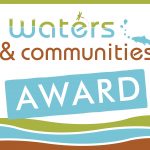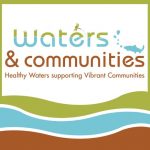Huge congratulations to Emyvale TidyTowns group from County Monaghan who…
TidyTowns – Waters and Communities Special Award
TidyTowns and other community groups groups can win a Waters and Communities Award, which is sponsored by Inland Fisheries Ireland, Waterways Ireland and the Local Authority Waters and Communities Office. Sheevaun Thompson tells us all about the 2017 award winner, and how you can enter your group for the 2018 awards…
The Waters and Communities Special Award aims to encourage communities to get more involved with their local waterbodies by helping to preserve, promote and fully use their local natural heritage.
Last year, the overall winner of the award was Emyvale TidyTowns group from County Monaghan. They were presented with prize money of €2,000 and a bespoke birdbox by the Minister for Rural & Community Development, Deputy John Ring, TD at the TidyTowns Awards Ceremony in September 2017. All other winners and runner ups were presented with their prizes at regional awards ceremonies.
TidyTowns Waters and Communities Award 2017 Overall Winner – Emyvale County Monaghan
Raising awareness is the motto of Emyvale TidyTowns in County Monaghan. In 2017 they had some great initiatives:
- Emy Lough and river clean ups
- Citizen Science project to monitor Emy Lough in conjunction with Emy and District Anglers
- Started a water bottle and silt traps river awareness project
- Conducted an initial wildflower survey of Emy Lough
- Worked with Monaghan County Council to identify dumping hotspots near the river and lake
- Upcycled timber pallets to make new bee, bat and bird boxes
- TidyTowns members got involved in the River Blackwater Catchment Trust, an initiative to control invasive species, and the steering committee of the ‘Our Water, Our Community’ initiative headed up by Dundalk IT
Can your community group win the Waters and Communities Award in 2018?
After receiving almost 60 entries from across Ireland in the inaugural year of the TidyTowns Waters and Communities Award in 2017, the Award is set to run again in 2018. A total prize fund of €7,000 will be divided between the winning community groups.
Community groups who have shown an appreciation for their water environment and water heritage from June 2017 to May 2018 will be considered. Examples include: clean ups; provision or upgrading of amenities; support to biodiversity and heritage; promotion of angling; awareness raising; etc.
How to enter:
Details of the application process will be announced on 28 March 2018 in conjunction with the main SuperValu TidyTowns Awards, and the other Special Awards.
See www.tidytowns.ie for further details.
TidyTowns Waters and Communities Award 2017 Regional Awards
North West and West
Regional Winner: Emyvale Tidy Towns (see above)
Regional Runner Up: Culdaff River Community Angling Club is a grass roots group, actively engaged in promoting game angling on the river. During 2016/2017 the club installed footbridges and stiles along a 1.5km section of the river with financial assistance from the Loughs Agency. The club have seen an increase in the number of people angling on the river due to opening up the access along the river. They took part in habitat surveys; conducted reed counting; they worked with the local TidyTowns on the National Spring Clean and participated in a sea trout survey project in conjunction with the Loughs Agency’s freshwater scientific team. Some of the members have had training in Riverfly Monitoring and five club members have been trained to take invertebrate samples at designated sites to determine river quality. The club also facilitated a visit by the local young wildlife explorers club to the river and helped to demonstrate the kick sampling methods used for the Riverfly monitoring and fly fishing techniques.
Midlands and East
Winner: The Dodder Action Group have been organising up to ten clean ups every year for the past number of years including their annual big clean up on ‘Dodder Day’ which involves up to 300 volunteers cleaning 15km of the river. The group run a ‘Dodder Monsters’ initiative to educate children about the negatives of littering and dumping in the river. They organise heritage walks and information talks on removing invasive species. They are very active in the development of the ‘Dodder Greenway’ and in the planning and development of the lands surrounding the Dodder. During the year, the Dodder Action Group organised ‘The Gathering’ which was a 3-day event to explore the Dodder River. They are also installing a sensory trail along the river.
Runner Up: Baltrasna Boreen Biodiversity Group is a cross generational group which grew out of a long standing informal residents group which has completed regular clean ups for some 20 years along the banks of the canal at Baltrasna Bridge, Mullingar. In 2016 they started a programme of monthly nature walks along the canal. They report to the National Biodiversity Data Centre on bees, butterflies and dragon flies recorded on the walks. With grant aid from Waterways Ireland, they bought materials for bird boxes, bee hotels and insect mansions. With the assistance of Westmeath County Council, they held a children’s biodiversity competition in the summer of 2016 and held an exhibition in Mullingar Library for 2 weeks in April 2017 showcasing their activities during 2016. They are affiliated to Mullingar TidyTowns and their biodiversity work will compliment the work of the TidyTowns. They have great plans to continue to raise awareness, develop signage, a grass cutting regime, survey work and annual exhibitions.
South East
Winner: The Friends of St. John’s River is a relatively new group who came together to develop St. John’s River and walkway in Waterford City. In September 2016, they helped with a major clean up of the river and since then they hold weekly clean ups. They have planted hundreds of trees, tulip bulbs and wildflowers along the river in recent times. They facilitate biodiversity nature walks and talks along the river and work with other community groups in the area to promote the river walk as an amenity and for schools to enjoy as an outdoor classroom. They have developed linkages with the Waterford Small Boat Owners Association and have managed to bring small boats up the river in an effort to bring back more leisure activity on the river. They have erected bat and bird boxes and have built bug hotels. They work with Waterford City and County Council to develop projects and volunteer to do works such as; grass cutting and removal of overhanging branches. The group plan to work to maintain, preserve and continually improve the beautiful walkway and to bring back St. John’s River to its former glory when it was used from its entry at Scotch Quay in Waterford City right out to Balindud.
Runner Up: Cheekpoint & Faithlegg Development Group work to bring attention to the local strand area and the litter that washes up. Cheekpoint is at the head of Waterford Harbour and is located where the three sister rivers, the Barrow, Nore and Suir meet. During the year, the group worked with An Taisce Clean Coasts to hold a beach clean during National Spring Clean week. They ran a local waste awareness campaign about the strand, the rivers and waste issues in the local national school. As part of a competition, they invited the local community to walk the beach and find materials to create a poster on an object to create awareness about waste. They had 40 entrants to their “All Washed Up” competition and showcased the entrants at a Waste Awareness Exhibition and announced the winners at a Village Fun Day. The group work closely with Clean Coasts, the Local Authority and their local TidyTowns group.
South and Mid-West
Winner: Glounthaune TidyTowns has been actively supporting and advancing the major Harper’s Island Birdwatching Facility and Nature Reserve project in County Cork. The group participate in two annual Coastal clean ups of the adjacent Glounthaune Estuary and have rehabilitated the local Ashbourne Pond by eradicating Japanese Knotweed, and improving the water flow and quality to allow the return of wildfowl. They erected a sigh for South and East Cork Bird trail and have erected bird and bat boxes. Recently, they have been successful in their application to the Heritage Council for funding under the Community Heritage Grant Scheme 2017 for a “Web based record of a successful community-led Japanese Knotweed Eradication project.” This has the potential of making accessible the practical learning and know-how accumulated during the project to a much wider audience.
Runner up: Castletownroche TidyTowns Committee work consistently to develop the Awbeg River which is one of the most attractive river valleys in Co. Cork. Milling holds a central place in the history of Castletownroche and in 2016, the group restored the sluice gates on the River Awbeg. The restoration project was purely for aesthetic purposes, the gates cannot be used however they look very pretty. Construction of a Living Willow Bower on the banks of the River Awbeg in an area previously known as “The Twig Yard” commenced in April 2017 and will reintroduce a new generation to weaving and to the willow. The group organise outdoor classroom events about river heritage. For several years there were ducks on the stretch of river and they added to the amenity value. The group celebrated their River Heritage by reintroducing ducks to the Awbeg River on Water Heritage Day, 27th August 2017.







